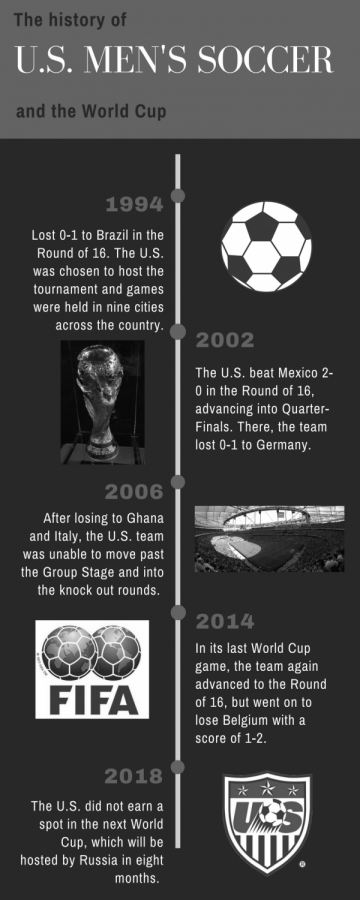World Cup Chaos
November 17, 2017
Americans all over the country were devastated on Nov. 17 when the U.S. Men’s National soccer team lost 2-1 to Trinidad and Tobago. To qualify for the World Cup competition, the United States only needed to tie or beat the team, a seemingly easy feat considering the island country’s team is ranked 83rd in the world. While some people expected the United States to fall short in later qualifying rounds, many were taken off guard to discover that the nation would not be competing in the 2018 Fifa World Cup at all.
Many factors are to blame for why the U.S team fell short in the qualifying process. Since soccer is less popular in the United States than in many other nations, some believe that the team may have had a financial disadvantage compared to the competition.
“Everything is a business in the United States, so all the clinics, extra training and even teams cost a ton to be on,” junior Olivia Fergerstrom said. “In other countries, you see free academies to raise athletes; you don’t need money in those countries to play soccer.”
There are many limitations for young players looking to play competitively, as travel soccer, along with camps and clinics, is often expensive.
“It’s a lot harder to play the game in this country if you don’t have a lot of money,” Fergerstrom said.
Not only does money affect national athletics, but the abundance of choices in the United States also influences the competitive level of play when it comes to worldwide sports. Due to the variety of major league sports in the media, it is difficult to make a lasting impression in the United States on the average viewer’s mind. In many other countries, however, soccer is often the most prominent and popular sport by far. In Europe, the main motive is to train young athletes that can play at an intense, competitive level. In the United States, there are relatively few organizations completely dedicated to training future professional soccer players.
“There’s no coaches, no organizations, and those are how players gain their skills,” physical education teacher and girls’ varsity soccer coach Melissa Bibbee said. “Here, it’s very rare that you see kids just go out and play. I think that’s a problem. In other countries, soccer is the choice. They don’t have American football.”
Despite these drawbacks, the expectations of our national soccer team varied and many people had different reactions. Some faculty and students predicted this outcome and weren’t surprised with the results of the team’s season.
“My reaction was pretty much disappointment, but not really surprise. I saw it coming,” Bibbee said. “Men’s soccer in our country has not really progressed much, and I’m not sure it’s going to. Honestly, I think we need to just go with young guys. Players that are in their twenties, or in the academies, or playing overseas.”
Others were more surprised and upset after the news. Because it has been three decades since the United States last failed to qualify for the World Cup, many were astounded that the nation would not be participating in the tournament.
“I did not expect them to lose,” sophomore Kaavya Parikn said. “I think there needs to be some major changes in the system because obviously, something is not working.”
Despite the disheartening downfall of the American national soccer team, many students, athletes and faculty will still continue to enjoy their favorite sport and support the tournament, no matter the final outcome.
“I will be watching, but it’s just not the same without the United States,” Parikn said. “It’s just sad.”


